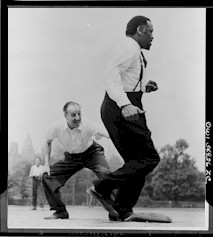 |
|
 |
Intro | First Years | 1919 | 1920's | 1930's | 1940's | 1950's | 1960's | 1970's | 1980's | 1990's 2000-2003 | 2004 | 2005 | 2006 | 2007 | 2008 | 2009 | 2010 | 2011 | 2012 | 2013 |
 |
"Hurry up and close that Big Show" |
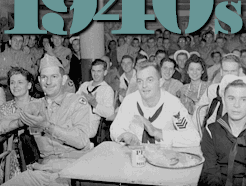 Enjoying the Stage Door Canteen, 1942, NYC Library of Congress 1940
Equity Magazine calls it "a really first class fight": major conflict over salaries at the spectacle play American Jubilee at the World's Fair. Mayor La Guardia intervenes when negotiations reach an decidedly unjubilant impasse. A compromise is reached. March 3
The first Broadway show broadcast on television airs tonight to an audience of 10,000: When We Are Married on NBC. July 4
Congressman William P. Lambertson accuses seven members of Equity Council of being communists. Because of the scandal, Equity's Nominating Committee, although it feels the charges are unjust, still does not put the seven names up for renomination. One of the accused is urged to become an independent candidate. Later in the year, Equity will state on the record that it opposes communism. After years of struggle, Equity gives in and permits Sunday performances with no extra pay. The Selective Service System for compulsory military draft during peacetime is created by Congress. Roosevelt is reelected President. The German Army invades France, marching into Paris. German bombing of London begins. "Blood, toil, tears and sweat": Winston Churchill becomes British Prime Minister. 1941
June 6
When the "accused" independent candidate wins reelection to the Council, two officers and eight Council members resign. As America enters the war, there are approximately 200 Actors' and Chorus Equity members in the armed forces. In December, Council will arrange for members in the army to receive personal letters, copies of Variety and Equity Magazine. December 7
Attack on American forces at Pearl Harbor, Hawaii by the Japanese Air Force. 18 U.S. warships, 170 planes are destroyed, 2,000 Americans are killed. The United States enters World War II. December 15
The American Theatre Wing is created. Rachel Crothers is its President. 1942
Broadway at war: The lights on the Great White Way are dimmed for fear of air raids. In April, The Moon is Down, the dramatization of John Steinbeck's novel about the Nazi invasion of Norway, opens at the Martin Beck. As FDR says, "Entertainment is always a national asset; invaluable in time of peace, it is indispensable in wartime." Eight to ten Equity members are joining the armed services every week. March 2
The American Theatre Wing opens the "Stage Door" Canteen in the 44th Street Theatre building. Lee Shubert gives the space for use rent-free. Service men and women - black and white - are admitted free. On opening night 1,382 servicemen come; 10,000 visit during the first week of operation. All workers at the Canteen are volunteers; Broadway stars mingle easily with the service men and women. In the first seven months, the Canteen serves more than 300,000 sandwiches; 211,000 half-pints of milk; 450,000 doughnuts; 450,000 cups of coffee; 3,500 pounds of candy; 3,080 gallons of fruit juice; and 642,000 cigarettes. June
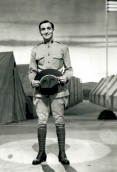 Irving Berlin Irving Berlin presents his revue, This Is The Army at the Broadway Theatre. The proceeds go to the Army Emergency Relief Fund. The cast, at Berlin's insistence, is racially integrated, the Army's only such unit. July
Soldiers at Fort Meade, Maryland, come out to see a production of Macbeth, starring Maurice Evans and Judith Anderson. The show is a wild success. Philip Huston writes in Equity Magazine, "The theatre can be important only where the need for it is important. And some three million khaki-clad arms point to where that need is."
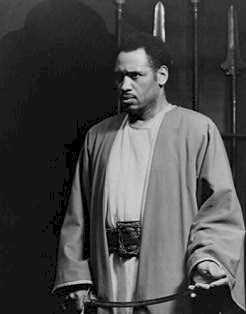 Paul Robeson is a hit as Othello Library of Congress |
1943
Tired of the lack of avenues to showcase membership talent, Equity creates the Equity Library Theatre. Public library stages throughout the city are used to showcase actors performing in public domain works. Actors are not paid, but get a chance to showcase their talents in front of directors and casting agents. Throughout the years, ELT alumni have included Martin Balsam, Ossie Davis, Charlton Heston, Earle Hyman, Anne Jackson, James Earl Jones, Lee Marvin, Sidney Poitier, Tony Randall, Kim Stanley, Elaine Stritch and Eli Wallach. March 31
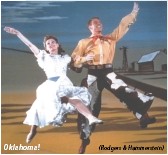 Oklahoma! opens at the St. James Theatre, the first of many collaborations between Richard Rodgers and Oscar Hammerstein II. April 5
In a huge spectacular at Madison Square Garden, 750 stars of stage, screen, radio and music, along with choruses and bands from many Broadway shows, all come together to benefit the Red Cross. The show is conceived by Equity President Bert Lytell. The benefit raises $250,000. Letter to Equity Council, July 1943, from the companies of several Broadway shows: "Ladies and gentlemen of the Council: Within the past two years, particularly since the advent of night dim-out regulations, a wave of crime, known as 'muggings' has broken out all over the Greater New York area..." The Equity editorial title says it all: "Starving A Workhorse." The House Ways and Means Committee is considering raising the tax on theatrical admissions from ten percent to thirty percent. October 7
After becoming an American citizen in August, Kurt Weill opens One Touch of Venus at the Imperial. S.J. Perlman and Ogden Nash supply the book, Mary Martin stars. October 19
Paul Robeson is Othello on Broadway, opposite Jose Ferrer and Uta Hagen. In June, Paul Robeson refused to play in Washington, D.C. and Baltimore theatres due to their policy of segregated audiences. 1944
Another war rages: Equity beats the Condon-Osterling Bill in the New York Legislature which would have allowed theatrical agents to remove the cap on what they can charge for their services. Equity creates the Hotel Accommodations Committee with the mission of finding accommodations for members, especially minority actors who are turned away from segregated hotels. June 6
D-Day: Allied Forces, under the command of Dwight D. Eisenhower, invade Normandy. July 7
The first season of the Theatre Softball League begins. Among the players are Paul Robeson and JosÚ Ferrer, on Broadway in Othello.
November
In a message to all Equity servicemen, Elliot Nugent writes, "When you read about the Big Broadway season, don't let it fool you. It is getting harder and harder to cast - especially young men. Hurry up and close that big show. We need you here." Although he is ailing, FDR wins an unprecedented fourth term as President. In December the German counterattack at the Battle of the Bulge fails. 1945
Frederick O'Neal and Judy Holliday win the first Equity Clarence Derwent Awards. April 12
Franklin Delano Roosevelt dies. Saturday matinees are cancelled because of his funeral. Harry Truman becomes President. April 19
Just across the street from the still-playing Oklahoma!, Carousel by Rodgers & Hammerstein opens at the Majestic. May 7
Germany surrenders to the Allies. VE Day will be declared the next day. June 26
United Nations is established. August 6
The United States drops an atomic bomb on Hiroshima, Japan. On August 9th, another A-Bomb will be dropped on Nagasaki. On September 2, Japan will formally surrender to the United States. August 15
Nearly one million people gather in Times Square for official word of the end of World War II. September 28
Equity member Frank Fay wants to investigate five Equity members who were at a Spanish Civil War benefit at Madison Square Garden where the Catholic Church and the Pope were insulted. It turns out the members spoke briefly, but left before the insulting remarks were spoken. Fay is later censured by Council and membership. |
December
Although there are only thirty shows open on Broadway, the USO (United Service Organization) has fifty-nine touring companies in the U.S. and 228 out of the country. Over two thousand actors are employed by the USO. In a heated meeting with Mayor La Guardia at City Hall, representatives of the theatre unions protest when the Commissioner of Licenses will not renew the license of the Belasco Theatre until the play Trio is withdrawn. The play by Dorothy Baker is about a romantic triangle with lesbian overtones. La Guardia agrees to work with the unions on legislation to make swift jury decisions on "indecent, immoral or repulsive" plays. In the meantime, the Commissioner of Licenses will no longer use his powers to censor plays. 1946
January
JosÚ Ferrer writes in Variety that he will never again perform in front of a segregated audience. May 16
Annie Get Your Gun, with music by Irving Berlin, opens at the Imperial. October 9
Eugene O'Neill's The Iceman Cometh opens at the Martin Beck. 1947
Equity and the Nation Heard on Broadway for the first time: "STELLAAAAA!" A Streetcar Named Desire opens at the Barrymore on December 3, starring Marlon Brando, Jessica Tandy, and Kim Hunter. April 6
The first Antoinette Perry, or "Tony" Awards, are handed out at the Waldorf-Astoria Hotel, sponsored by the American Theatre Wing. Theatre owner Vinton Freedley writes, "This definitely must be an annual event." June 3
Under the leadership of Margo Jones, Theatre '47, America's first modern professional repertory company, opens in Dallas. June 29
Speaking to the NAACP from the steps of the Lincoln Memorial, President Truman calls for a new vision of civil rights in America: "It is my deep conviction that we have reached a turning point in the long history of our country's efforts to guarantee freedom and equality to all our citizens..." December 21
The 299-seat New Stages Theatre on Bleecker Street opens; the theatre later becomes Circle In The Square. Over the President's veto, Congress passes the Taft-Hartley Act, which severely curtails unions' power. Truman calls it a "slave-labor bill." The House Un-American Activities Committee begins an investigation of the Motion Picture Industry. This will lead to a blacklist of over 320 people, including Lillian Hellman, Paul Robeson, Zero Mostel, Clifford Odets, Arthur Miller and Yip Harburg.
The La Jolla Playhouse is founded by Gregory Peck, Dorothy McGuire and Mel Ferrer.
1948
Equity condemns blacklisting, and creates the rule that no Equity member may defame another. July 14
LibertÚ, EgalitÚ, but not much FraternitÚ: fistfights break out during negotiations between Equity and the League of New York Theatres on this Bastille Day. The minimum salary will go to $75. Truman is elected President. 1949
"Attention must be paid..." February 10: Death of a Salesman by Arthur Miller opens at the Morosco. April 7
South Pacific opens at the Majestic, directed by Joshua Logan. NATO, the North Atlantic Treaty Organization, is established.
|
||
| to timeline introduction... | ||||
